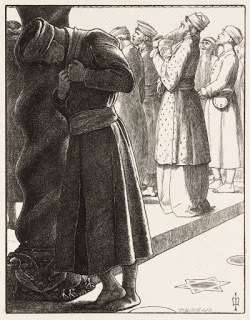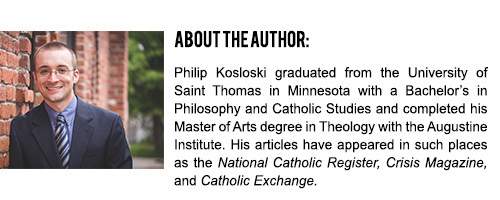
To continue our series on the different parts of the Holy Sacrifice of the Mass, we continue to examine the Introductory Rites and take a look at the "The Penitential Rite.”
"Then the priest invites those present to take part in the Act of Penitence, which, after a brief pause for silence, the entire community carries out through a formula of general confession. The rite concludes with the priest's absolution, which, however, lacks the efficacy of the Sacrament of Penance." (GIRM, 51) The history of asking for forgiveness at the start of Mass is very long and rich and started with Christ at the Last Supper: "In the primitive Church, which had its roots in the heart of Christ, there was a spontaneous sense of the soul's need to ask for pardon at the beginning of Mass. (And, indeed, it seems that there may have then existed a penitential rite like the washing of the disciple's feet by Jesus before the Last Supper.) "The Roman Missal as drawn up in 1570 [formalized the need to ask pardon before Mass and] constructed [the rite] in the dramatic manner associated with the four states of a trial:the soul appears before the bar of justice, the soul confesses its guilt, the advocates plead, and pardon is granted. This is a public collective prayer in which priest and people...acknowledge their sinfulness, not just privately, but in the face of the whole Church, of all her saintly witnesses, and even in the face of the very powers of Heaven." (This is the Mass, 32) The current translation of the Penitential Rite not only "better reflects the Latin text of the Mass [it also]helps us cultivate a more humble, sorrowful attitude toward God as we confess our sins. Instead of simply saying that I have sinned 'through my own fault' as we have in the old translation, we...now repeat it three times while striking our breasts in a sign of repentance, saying 'Through my fault, through my fault, through my most grievous fault.' This repetition more fully expresses our sorrow over sin...This prayer in the liturgy helps us recognize that sinning against God is no light matter. We must take responsibility for whatever wrong we have done and whatever good we failed to do." (A Guide to the New Translation of the Mass, 11) Henri Daniel-Rops describes the symbolism of the Penitential Rite best when he writes: “The thrice repeated act of deep repentance, at [through my fault], when the hand strikes the breast in an old biblical and monastic gesture, brings consolation to the sinner in his racking sorrow; for is it not written that the prayer of the humble shall be heard before the Most High? (Ecclus. 35:21) (This is the Mass, 32) The next time you attend Mass and recite these words, envision yourself at the Last Supper, begging pardon from Jesus, before he hand you the bread that is His body. I confess to almighty God, and to you, my brothers and sisters, that I have greatly sinned in my thoughts and in my words, in what I have done and in what I have failed to do, [strike breast while saying] through my fault, through my fault, through my most grievous fault; therefore I ask blessed Mary ever-Virgin, all the Angels and Saints, and you, my brothers and sisters, to pray for me to the Lord our God. Read the Entire Series
0 Comments
Your comment will be posted after it is approved.
Leave a Reply. |
MASS SCHEDULE
Tuesday - Friday: 8:00 AM Saturday: 4:00 PM Sunday: 8:00 AM & 10:00 AM RECONCILIATION
Saturday: 3:15 - 3:45 PM OFFICE HOURS
Monday - Thursday: 8:30 AM – 5:00 PM Friday: 8:30 AM – 12:30 PM Stay Connected with Our ParishWelcome from Our PastorWelcome to Christ the King Catholic Church! Ever since 1938 this parish has been assisting souls in their quest for deeper union with God. Our mission statement is essentially found in the stained glass window above the main altar: “For Christ our King.” Insofar as God made us and we belong to Him, we have come to... Read More
Archives
February 2021
Categories
All
|
Copyright © 2024 Christ the King Parish. All Rights Reserved.
Mailing address: 306 S. LaSalle St, Spencer, WI 54479
(715) 659-4480



 RSS Feed
RSS Feed